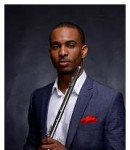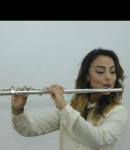Featured Flute Teachers In Georgia

jordan S
Instruments: Piano, Guitar, Saxophone, Flute, Clarinet, Ukulele, Recorder, Keyboard, Electric Guitar, Acoustic Guitar
During my 18 Yrs of teaching private lessons I’ve learned so much. I’ve grown as a person, performing musician and as a teacher. Music is very a rewarding passion, I strive to communicate my joy and desire to all of my students no matter the age, goals or instrument. Rock n roll was my first love but I studied classical and jazz at the university, along with musical theatre and orchestra gigs. Read More

Carey M
Instruments: Flute, Piccolo
My teaching experience dates back to my college days as I would frequently conduct flute sectionals for local middle schools. I began teaching flute privately in 2008 after completing my Master of Music Degree. I currently work with students and band programs in several counties in the metropolitan Atlanta area. My students have been selected for both District Honor and All-State Band, as well as earned places at the University of Georgia middle and high school band clinics, received college scholarships, earned superior ratings at Solo and Ensemble festival, and often occupy the principal chair in their high school band programs. Read More

Jasmine B
Instruments: Piano, Flute, Ukulele, Recorder, Keyboard, Acoustic Guitar
I am extremely passionate about all things music. I have been playing the flute and piano for 15 years. I graduated from Mercer University in May of 2016 with a Bachelor of Arts degree in Music. I have performed at many musical conventions during my career, including the National Flute Association Convention in 2013 and 2015. I was also recently selected to perform in the NFA Collegiate Flute Choir at the 2016 annual convention. Through my graduate coursework at Georgia College State University, I have learned how to play the guitar and the ukulele. Read More

Andre J
Instruments: Saxophone, Flute, Clarinet, Recorder, Piccolo
One of my greatest joys have always been to see my students make progress and express how happy they are with themselves after working hard, and this is one of my greatest motivations to teach and give teaching all that I've got. As a private studio instructor, I encourage my students to keep detailed notes of our lessons and record their practice sessions and discoveries in that same note book for this helps with organization and focus, thus eliminating the need for aimless practicing and playing of ones instrument. Read More

Diana P
Instruments: Flute, Music
Nothing is more rewarding than seeing one of my students develop a passion for music! Therefore, it's important that each student progresses at his or her own pace. I encourage this by setting realistic goals for my students at each lesson. Acknowledging accomplishments helps fuel a students desire to progress, and makes students eager to learn more. By trying to find out what inspires the student, I can successfully tailor my instruction to their wants and needs. Read More

BBB Accredited
Don't just take our word for it. We hold the highest possible A+ rating from the nations foremost online reliability source: The BBB. Check out our A+ rating from the Better Business Bureau.